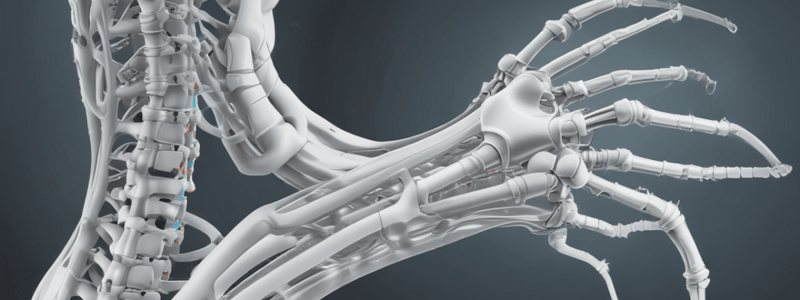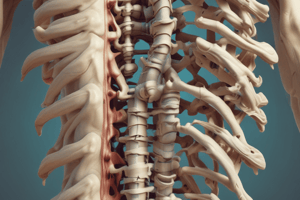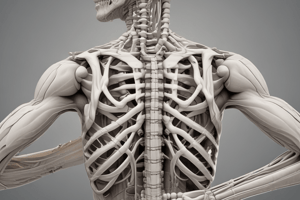Podcast
Questions and Answers
Which of the following is a primary impairment related to a rounded back and protracted scapulae?
Which of the following is a primary impairment related to a rounded back and protracted scapulae?
- Pain
- Weakness in the anterior muscles
- Vision impairment
- Forward head position (correct)
What secondary issue can arise due to forward head position?
What secondary issue can arise due to forward head position?
- Pain
- Tight posterior muscles
- Weakness in the posterior muscles
- Vision impaired (correct)
Which activity is likely to be difficult secondarily to kyphosis?
Which activity is likely to be difficult secondarily to kyphosis?
- Walking
- Driving
- Overhead activities (correct)
- Reading
What is a potential effect on driving due to posture-related issues?
What is a potential effect on driving due to posture-related issues?
Which muscle groups are affected by tightness and weakness in this clinical presentation?
Which muscle groups are affected by tightness and weakness in this clinical presentation?
Which characteristic best differentiates a normal spine from a kyphotic spine?
Which characteristic best differentiates a normal spine from a kyphotic spine?
What is the primary region affected by kyphosis?
What is the primary region affected by kyphosis?
Which of the following is NOT depicted in the image showing kyphosis?
Which of the following is NOT depicted in the image showing kyphosis?
In the comparison of normal and kyphotic spines, which spine demonstrates a straight alignment?
In the comparison of normal and kyphotic spines, which spine demonstrates a straight alignment?
What is a primary contributor to increased thoracic posterior convexity?
What is a primary contributor to increased thoracic posterior convexity?
Which spine condition is characterized by an exaggerated curve according to the image?
Which spine condition is characterized by an exaggerated curve according to the image?
Which condition is NOT mentioned as a contributing factor to kyphotic posture?
Which condition is NOT mentioned as a contributing factor to kyphotic posture?
What type of fracture is associated with anterior wedging leading to kyphotic posture?
What type of fracture is associated with anterior wedging leading to kyphotic posture?
What is one effect of stretched and weakened erector spinae muscles?
What is one effect of stretched and weakened erector spinae muscles?
Which structure, when lengthened, contributes to a rounded-back posture?
Which structure, when lengthened, contributes to a rounded-back posture?
Which muscle group should be targeted to strengthen the scapular retractors?
Which muscle group should be targeted to strengthen the scapular retractors?
Which of the following is a key component of conservative management for postural issues?
Which of the following is a key component of conservative management for postural issues?
Which muscle is NOT typically strengthened as part of conservative management for weak areas?
Which muscle is NOT typically strengthened as part of conservative management for weak areas?
In conservative management, which muscles are typically stretched to address shortened tissues?
In conservative management, which muscles are typically stretched to address shortened tissues?
What is an example of an educational aspect in conservative management?
What is an example of an educational aspect in conservative management?
Which of the following is a sign of scoliosis?
Which of the following is a sign of scoliosis?
What characteristic is NOT typically associated with scoliosis?
What characteristic is NOT typically associated with scoliosis?
A visible sign of scoliosis in a person's back includes:
A visible sign of scoliosis in a person's back includes:
Which of these symptoms would most likely suggest scoliosis?
Which of these symptoms would most likely suggest scoliosis?
In scoliosis, one common physical feature observed is:
In scoliosis, one common physical feature observed is:
What type of physical disfigurement is specifically noted during forward flexion in patients with scoliosis?
What type of physical disfigurement is specifically noted during forward flexion in patients with scoliosis?
Which factor primarily determines the extent of activity limitations in individuals with scoliosis?
Which factor primarily determines the extent of activity limitations in individuals with scoliosis?
Which activity may become particularly challenging due to the spine motions being uniformly limited in scoliosis patients?
Which activity may become particularly challenging due to the spine motions being uniformly limited in scoliosis patients?
What additional health issue may develop as a result of a thoracic curve in scoliosis?
What additional health issue may develop as a result of a thoracic curve in scoliosis?
Which clinical manifestation is indicative of scoliosis when bending forward?
Which clinical manifestation is indicative of scoliosis when bending forward?
What is the primary purpose of bracing in conservative management?
What is the primary purpose of bracing in conservative management?
Which of the following statements is true about physical therapy (PT) in conservative management?
Which of the following statements is true about physical therapy (PT) in conservative management?
What is NOT a benefit of PT in the context of conservative management?
What is NOT a benefit of PT in the context of conservative management?
Which of these interventions is designed to halt the progression of spinal curvature?
Which of these interventions is designed to halt the progression of spinal curvature?
Which symptom is NOT managed by physical therapy in conservative management?
Which symptom is NOT managed by physical therapy in conservative management?
Which characteristic uniquely identifies structural scoliosis?
Which characteristic uniquely identifies structural scoliosis?
What complication may arise due to structural scoliosis?
What complication may arise due to structural scoliosis?
Which condition can result in nonstructural scoliosis dissipating?
Which condition can result in nonstructural scoliosis dissipating?
What is a common cause of idiopathic scoliosis?
What is a common cause of idiopathic scoliosis?
How is the severity of structural scoliosis assessed?
How is the severity of structural scoliosis assessed?
What is the primary indication for surgery in severe spinal curvature cases?
What is the primary indication for surgery in severe spinal curvature cases?
Which of the following is the most common rod used in spinal fusion surgeries?
Which of the following is the most common rod used in spinal fusion surgeries?
What is the typical sequence of treatments following spinal surgery for severe cases?
What is the typical sequence of treatments following spinal surgery for severe cases?
How much did the spinal curvature improve post-operation as shown in the x-ray images?
How much did the spinal curvature improve post-operation as shown in the x-ray images?
Which of the following best describes the nature of spinal fusion surgery for severe curvatures?
Which of the following best describes the nature of spinal fusion surgery for severe curvatures?
Flashcards are hidden until you start studying
Study Notes
Kyphosis
- A curved spine, with the curve exaggerated in the upper thoracic region
- Characterized by increased thoracic posterior convexity and rounded-back posture
- May be caused by lengthened posterior longitudinal ligament, stretched and weakened erector spinae and rhomboids, or other neurological and postural syndromes
- Compression fractures can cause anterior wedging, leading to kyphotic posture
Clinical Presentation of Kyphosis
- Impairments: rounded back, protracted scapulae, forward head position, and impaired vision
- Activity limitations: visual limitations, difficulty with overhead activities, and impaired driving
Conservative Management of Kyphosis
- Stretching shortened tissues, such as pectoralis and anterior shoulder muscles
- Strengthening weak areas, including scapular retractors and erector spinae
- Patient education, postural education/training, and bracing
Scoliosis
- Characterized by uneven shoulders, curves in the spine, and uneven hips
- Lateral curvature of the cervical, thoracic, or lumbar spine, which can be idiopathic or caused by neuromuscular, degenerative, osteoporosis, traumatic, or postsurgical factors
Pathophysiology/Pathomechanics of Scoliosis
- Structural scoliosis: irreversible lateral curve with fixed rotation of the vertebrae, convexity of the curve, and decreased cardiopulmonary function and neurologic signs
- Nonstructural scoliosis: reversible lateral curve that dissipates with postural or positional changes
Clinical Presentation of Scoliosis
- Impairments: back pain, disfigurement, and rib hump
- Activity limitations: dependent on severity of curve, impaired respiration, limited spine motions, and difficulty with prolonged standing activities
Conservative Management of Scoliosis
- PT for stretching, strengthening, and bracing to manage symptoms, but not to halt or correct curvature
- Bracing designed to halt progression of curve, but not to change appearance cosmetically
Surgical Procedures for Scoliosis
- Indicated for severe cases with curves greater than 50-60 degrees
- Surgery involves a major operation, requires bedrest, bracing, and a lengthy rehabilitation course
- Most common procedure uses rods, such as Harrington rods, and involves a full spinal fusion
Studying That Suits You
Use AI to generate personalized quizzes and flashcards to suit your learning preferences.





